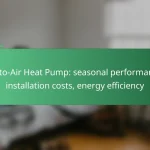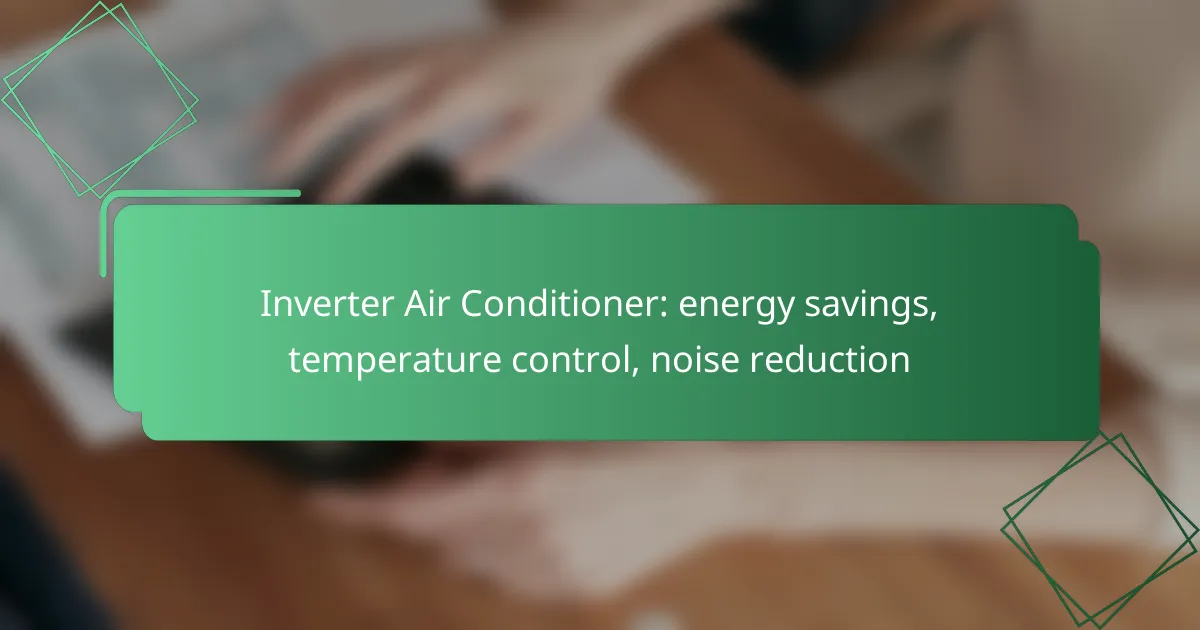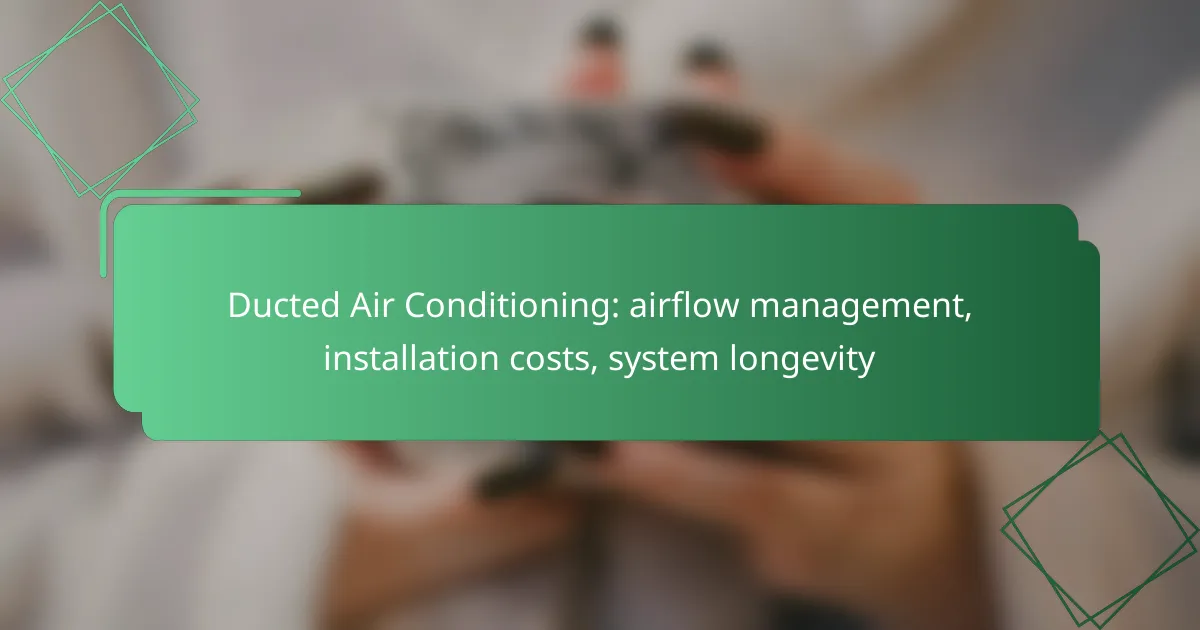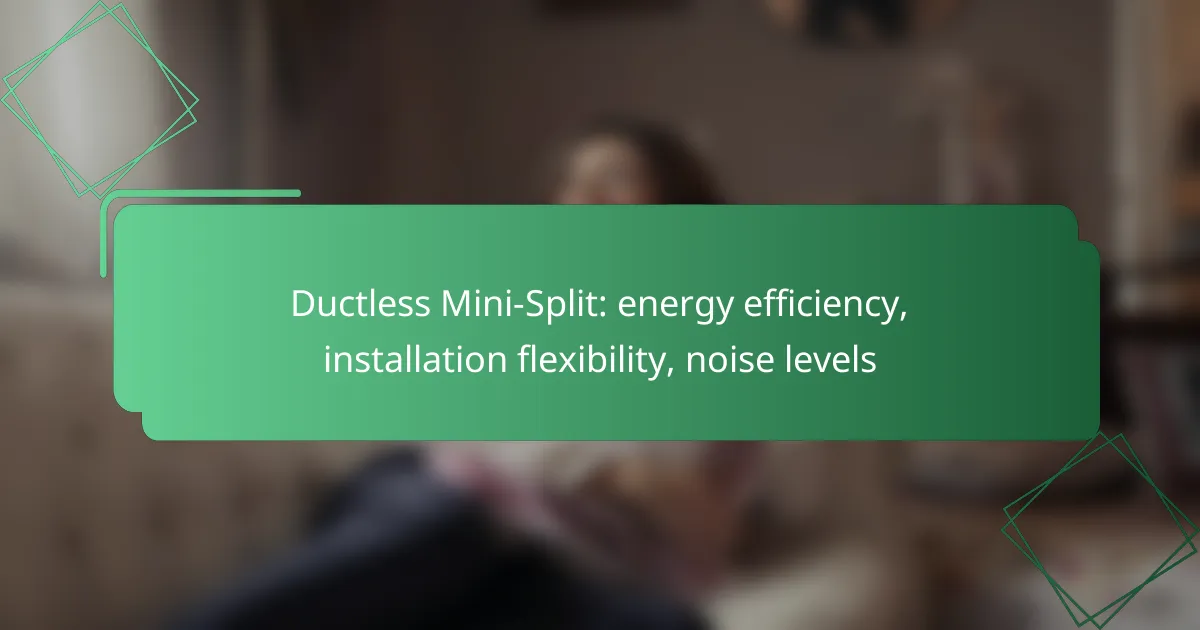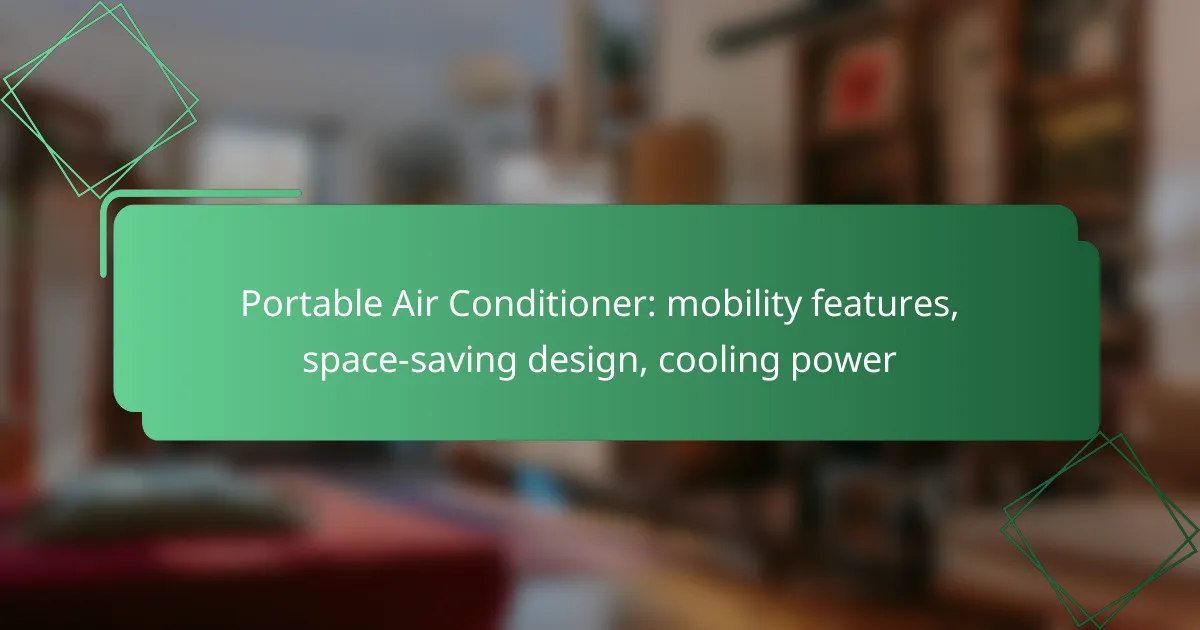Inverter air conditioners are designed to enhance energy efficiency by adjusting their compressor speed according to the cooling demand, leading to significant energy savings. They offer precise temperature control, ensuring a comfortable environment while minimizing energy consumption. Additionally, these systems operate more quietly than traditional air conditioners, as they maintain a consistent temperature without the disruptive on-and-off cycling.
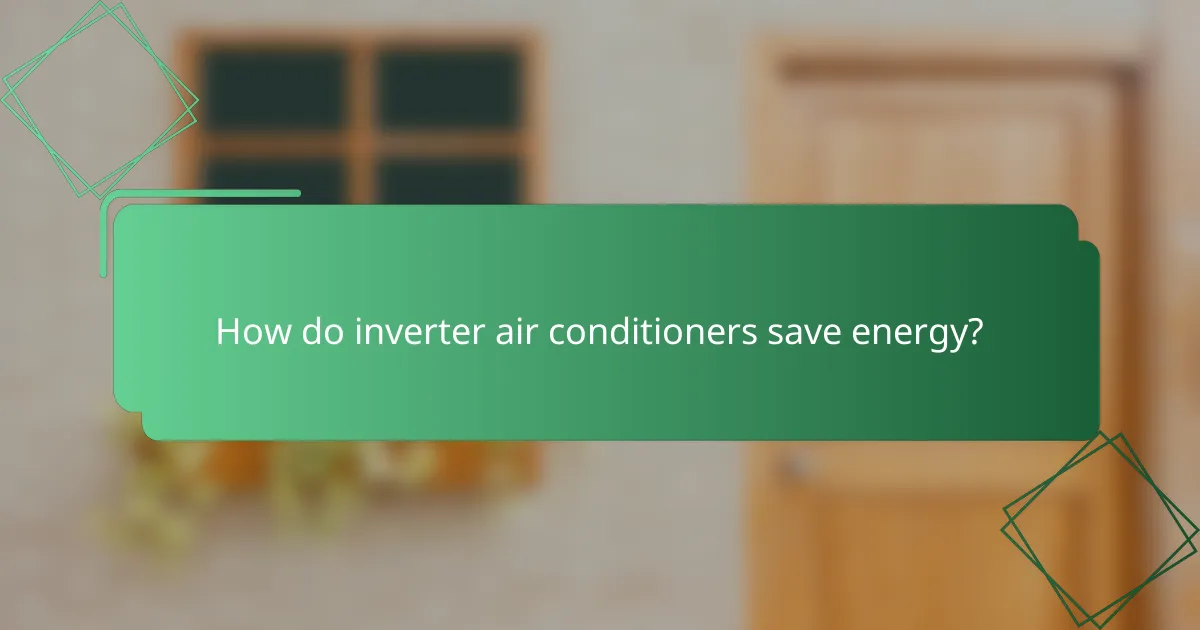
How do inverter air conditioners save energy?
Inverter air conditioners save energy by adjusting their compressor speed based on the cooling demand, which leads to more efficient operation. This technology allows for precise temperature control and reduces energy consumption compared to traditional systems.
Variable speed compressor
The variable speed compressor is a key feature of inverter air conditioners that enables them to operate at different speeds. Instead of turning on and off like conventional units, the compressor modulates its speed to maintain the desired temperature, resulting in less energy waste. This continuous operation helps avoid the high energy spikes associated with frequent start-ups.
Energy-efficient technology
Inverter air conditioners utilize advanced energy-efficient technologies to optimize performance. These units often incorporate features like improved insulation and heat exchangers, which enhance their ability to maintain comfortable indoor conditions. Additionally, many inverter models meet or exceed energy efficiency standards, such as SEER ratings, making them a smart choice for energy-conscious consumers.
Reduced energy consumption
By operating at lower speeds when cooling demand is low, inverter air conditioners can significantly reduce overall energy consumption. Users can expect energy savings of around 30-50% compared to traditional air conditioning systems. This reduction not only lowers electricity bills but also contributes to a smaller carbon footprint.
Smart thermostats integration
Many inverter air conditioners can integrate with smart thermostats, allowing for enhanced control and energy management. These smart devices can learn user preferences and adjust settings automatically, optimizing energy use based on occupancy and time of day. By utilizing smart technology, homeowners can further increase energy savings and improve comfort levels.
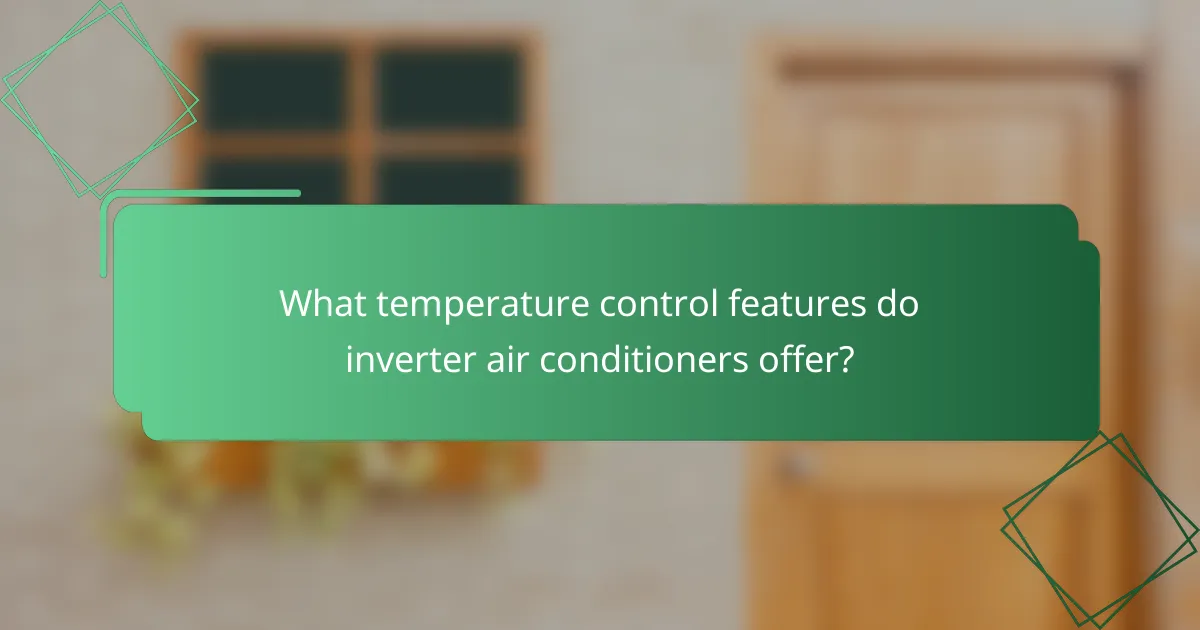
What temperature control features do inverter air conditioners offer?
Inverter air conditioners provide advanced temperature control features that enhance comfort and energy efficiency. They adjust cooling and heating output based on the current room temperature, ensuring a consistent and pleasant environment.
Precise temperature regulation
Inverter air conditioners utilize variable speed compressors that allow for precise temperature regulation. Unlike traditional units that turn on and off, these systems continuously adjust their cooling or heating capacity to maintain the desired temperature within a narrow range. This results in fewer temperature fluctuations and a more stable indoor climate.
For optimal performance, set your thermostat to a comfortable temperature, typically between 22°C and 24°C (72°F to 75°F). This range helps maximize energy savings while ensuring comfort.
Rapid cooling and heating
One of the key advantages of inverter air conditioners is their ability to cool or heat a space quickly. The variable speed compressor can ramp up to a higher capacity when the temperature deviates from the set point, allowing for rapid adjustments. This feature is particularly beneficial during extreme weather conditions.
Expect a temperature change within minutes, making inverter units ideal for spaces that require quick climate adjustments, such as living rooms or offices. However, ensure that the unit is appropriately sized for the room to achieve the best results.
Smart temperature settings
Many inverter air conditioners come equipped with smart temperature settings that enhance user convenience. Features such as programmable timers, remote controls, and smartphone connectivity allow users to set schedules and adjust temperatures from anywhere. This not only improves comfort but also contributes to energy savings.
Utilize these smart settings to optimize your energy consumption. For instance, program the unit to lower the temperature during peak heat hours and raise it when you are away, ensuring efficient operation without sacrificing comfort.

How do inverter air conditioners reduce noise?
Inverter air conditioners minimize noise by using advanced technology that allows for smoother operation and quieter performance. Unlike traditional units that frequently turn on and off, inverter systems adjust their compressor speed, resulting in less disruptive sound levels.
Quieter operation
Inverter air conditioners operate at lower decibel levels compared to conventional models. This is primarily due to their ability to maintain a consistent temperature without the abrupt starts and stops that generate noise. Many inverter units operate at around 20-30 dB, which is comparable to a whisper.
For residential use, this quieter operation is particularly beneficial in bedrooms or study areas where peace is essential. Users often report a noticeable difference in comfort and tranquility when switching to inverter technology.
Sound-dampening technology
Many inverter air conditioners incorporate sound-dampening technology to further reduce noise. This can include insulated compressor compartments and vibration-absorbing mounts that minimize operational sounds. These features help to create a more pleasant indoor environment.
When selecting an inverter AC, look for models that specifically highlight sound-dampening features, as these can significantly enhance your comfort level, especially in noise-sensitive settings.
Low-noise fan design
The fan design in inverter air conditioners is optimized for quiet performance. These fans often operate at variable speeds, allowing for smoother airflow and reduced turbulence, which contributes to lower noise levels. This design is crucial for maintaining a comfortable atmosphere without disruptive sounds.
Inverter units typically feature larger, slower-spinning fans that can move air efficiently without the high-pitched whirring associated with traditional systems. This makes them ideal for use in homes, offices, and other environments where noise reduction is a priority.
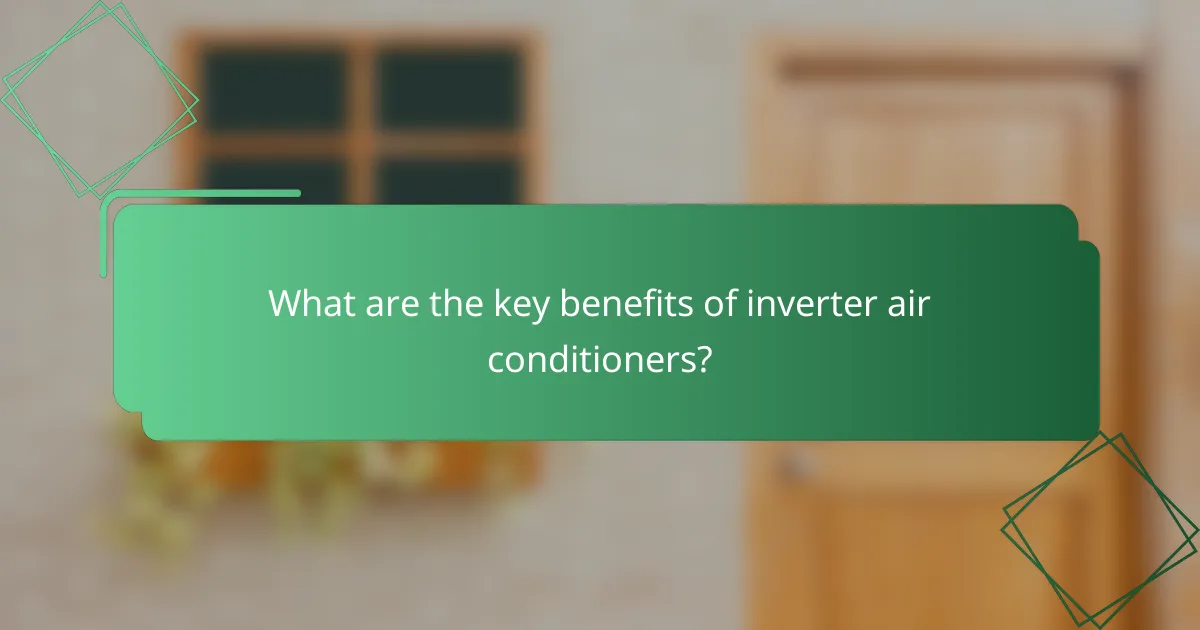
What are the key benefits of inverter air conditioners?
Inverter air conditioners offer significant advantages, including energy savings, enhanced temperature control, and reduced noise levels. These benefits make them a popular choice for both residential and commercial spaces.
Cost savings on energy bills
Inverter air conditioners are designed to operate more efficiently than traditional units, leading to lower energy consumption. They adjust their cooling output based on the current temperature, which can result in energy savings of around 30% to 50% compared to non-inverter models.
For example, if you typically spend $100 on energy bills during the summer, switching to an inverter unit could reduce that cost to between $50 and $70. This efficiency not only lowers bills but also contributes to a smaller carbon footprint.
Improved indoor air quality
Inverter air conditioners help maintain consistent temperatures, which can prevent the growth of mold and allergens. By continuously circulating air, these units filter out dust and pollutants more effectively than traditional systems.
Many inverter models come equipped with advanced filtration systems that capture microscopic particles, ensuring cleaner air. This is particularly beneficial for individuals with allergies or respiratory issues.
Longer lifespan compared to traditional units
Inverter air conditioners generally have a longer lifespan than conventional systems due to their efficient operation. By avoiding the frequent on-off cycling that traditional units experience, inverter models reduce wear and tear on components.
With proper maintenance, inverter air conditioners can last over 15 years, while traditional units may only last around 10 years. Investing in an inverter system can lead to fewer replacements and lower long-term costs.
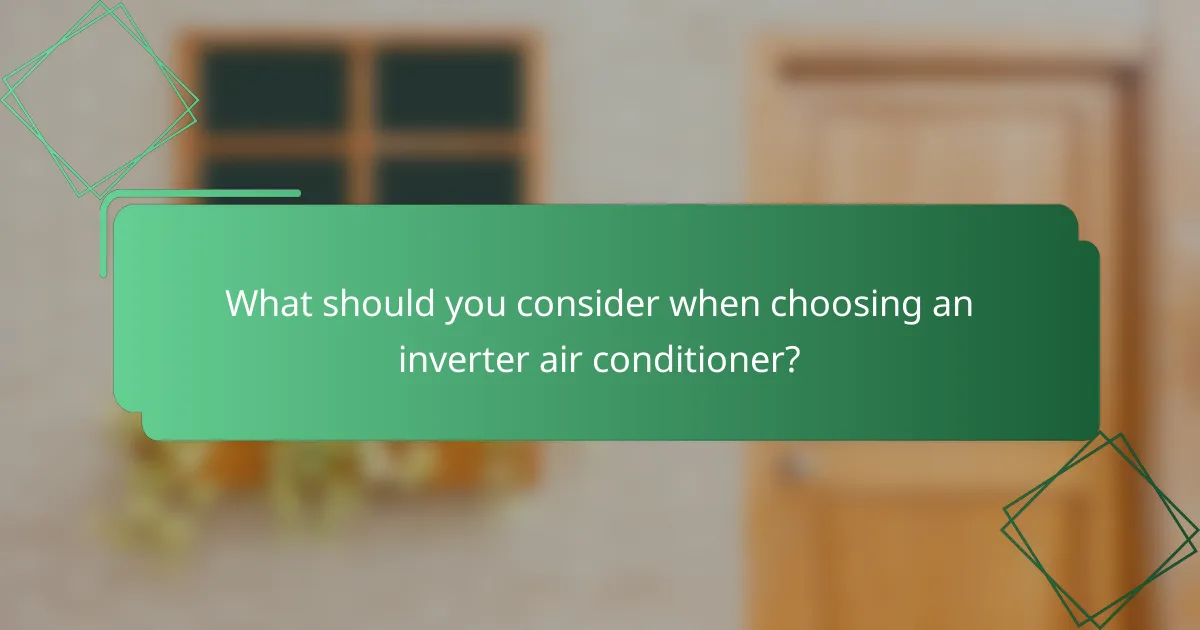
What should you consider when choosing an inverter air conditioner?
When selecting an inverter air conditioner, focus on cooling capacity, energy efficiency rating, and brand reputation. These factors will significantly influence your comfort, energy costs, and the reliability of the unit.
Cooling capacity
Cooling capacity is crucial as it determines how effectively the air conditioner can cool your space. Measured in BTUs (British Thermal Units), a higher BTU rating means a greater cooling ability. For a typical room, aim for around 20 BTUs per square foot.
Consider the size of the area you want to cool. If the unit is too small, it will struggle to maintain a comfortable temperature; if too large, it may cycle on and off frequently, leading to inefficient operation. A professional assessment can help you choose the right capacity.
Energy efficiency rating
The energy efficiency rating, often indicated by the EER or SEER (Seasonal Energy Efficiency Ratio), reflects how effectively the air conditioner uses electricity. Higher ratings mean lower energy consumption and reduced utility bills. Look for units with a SEER rating of at least 14 for optimal savings.
In many regions, energy-efficient models may qualify for rebates or tax credits, further lowering your overall costs. Always check local regulations and incentives when making your choice.
Brand reputation
Brand reputation plays a significant role in the reliability and performance of your inverter air conditioner. Established brands often provide better customer service, warranty options, and product longevity. Research customer reviews and ratings to gauge satisfaction levels.
Consider brands known for their innovation and energy efficiency, as they are more likely to offer advanced features that enhance comfort and reduce noise. A well-reviewed brand can save you from potential headaches down the line.


